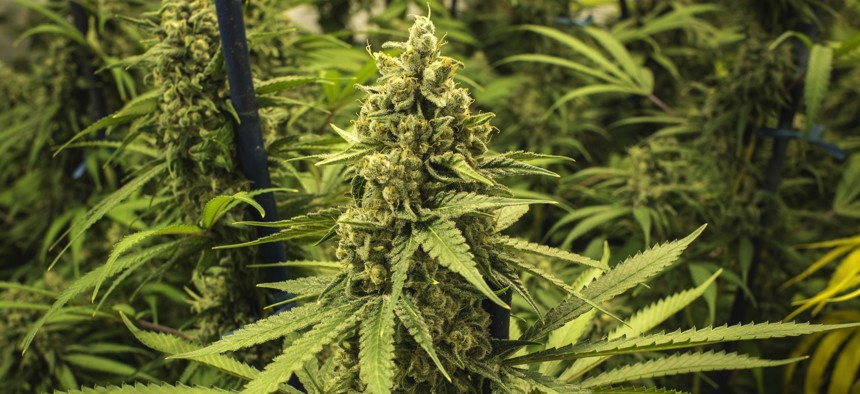Bringing Some Clarity to Complex Regulatory Questions in Legal Weed States

OpenRangeStock / Shutterstock.com

Connecting state and local government leaders
A University of Washington law school clinic will help government offices and private-sector startups navigate fast-moving regulations, markets, intellectual property law, health and science research.
BOULDER, Colo. — “College-age pot-smoking has skyrocketed.” (Or actually, Baby Boomer customers seem to be where you want to focus your advertising.)
“McDonald’s has a pot-smoking section!” (No, it doesn’t, and neither does Walmart—but they might, soon.)
“Medical marijuana shops are subject to health-care zoning, so you can build next to a school.” (No. And it depends.)
“This pot brownie recipe is the best and I’m going to make a lot of money from it.” (Well, do you have a patent on that? Because you’ll need one, even though you can’t really get one right now.)
Cannabis industry questions have come in at a lightning clip in Washington and Colorado since the two states legalized recreational pot use in 2012 and implemented the regulatory framework for legal cannabis sales.
And those legalized marijuana frameworks still tend to generate more questions than they do answers.
Consumers, entrepreneurs, lawmakers, and city councils have raced to catch up, as have zoning boards, tax offices, financial institutions, advertising departments, the drug-testing industry, packaging businesses, public safety officials and security firms, and so on.
Reliable information has been hard to find, giving rise to consultants—official and unofficial in the private sector and public sector.
For years in Colorado, the go-to man has been Mason Tvert. He was one of the people behind the long-running effort to legalize recreational marijuana in the Centennial State and he is now director of communications at the Marijuana Policy Project. He has worn what seems like a million hats in the era of legalization. Tvert is a fixture at legislative committees and in legal-weed news stories (like this one). Tvert knows the ins and outs of the industry and where to point people looking for answers, but there’s only one of him. More consultants and area-experts are needed and will be needed in states across the country as the legal cannabis movement spreads.
In Seattle, University of Washington School of Law professor Sean O’Connor is hoping to provide reliable high-end cannabis consulting in the Evergreen State.
O’Connor is an assistant dean who researches intellectual property and business law, especially concerning startups looking to bring technologies to market. He also develops consulting centers at the law school.
The latest is called the Cannabis Law and Policy Project, which he started this semester with a $185,000 grant from the state’s Liquor and Cannabis Board.
Over the last three years, the University of Washington’s Alcohol and Drug Abuse Institute has done consulting on cannabis, but it’s not a perfect fit, according to O’Connor.
“State agencies, the emerging cannabis industry, and the public are looking for trusted sources of research and information,” he said in a recent statement, adding that his project will include “faculty, staff, and students trained in law and regulatory systems, particularly with regard to approaching marijuana as a legal but well-regulated market similar to that for alcohol, dietary supplements or pharmaceuticals.”
One of the first aims of the project is to work with departments across campus to explore the size of local marijuana markets—the recreational and medicinal markets as well as the black market—and provide nailed-down summaries of the latest scientific debates and findings on cannabis use. The project will submit a report on its work to the state next year.
State governments, of course, are the center of this kind of consulting work. Cannabis is still illegal on the federal level, which adds layers of complexity to writing regulation, doing business, securing intellectual property rights, and so on.
In fact, for now, the main product that pot shops sell—strains of cannabis cultivated for taste and effect—can’t be patented, even though business success turns on how well customers come to appreciate and depend on, say, the earthy mellow of a “Golden Goat” sativa or the “viscous mouthfeel” and upbeat sensation delivered by a “Skywalker OG.”
Last year at Mainstreet, a PR page run by TheStreet financial services website, Chris Stanton advertised the services of intellectual property firm Merchant & Gould in Denver, where he’s an associate. He said weed businesses should get federal trademarks for products with non-pot ingredients, like pipes and packaging, and register weed strains and weed-based products with the secretaries of state.
“Trademark rights arise from use in commerce,” he said. “Registering a mark with the state provides great evidence of that use. There is a lot of value in that now."
John Tomasic is a journalist who lives in Boulder, Colorado.

NEXT STORY: Calif. Fire Chief’s Improper Pension Use; Memphis Mayor-Elect’s Policy Playbooks




